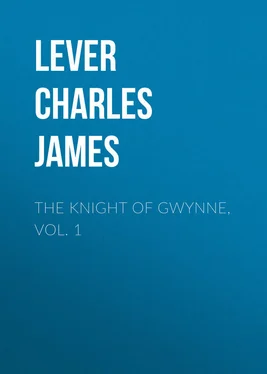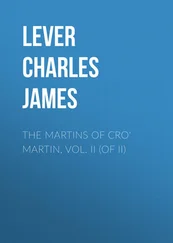Charles Lever - The Knight Of Gwynne, Vol. 1
Здесь есть возможность читать онлайн «Charles Lever - The Knight Of Gwynne, Vol. 1» — ознакомительный отрывок электронной книги совершенно бесплатно, а после прочтения отрывка купить полную версию. В некоторых случаях можно слушать аудио, скачать через торрент в формате fb2 и присутствует краткое содержание. Жанр: foreign_antique, foreign_prose, на английском языке. Описание произведения, (предисловие) а так же отзывы посетителей доступны на портале библиотеки ЛибКат.
- Название:The Knight Of Gwynne, Vol. 1
- Автор:
- Жанр:
- Год:неизвестен
- ISBN:нет данных
- Рейтинг книги:3 / 5. Голосов: 1
-
Избранное:Добавить в избранное
- Отзывы:
-
Ваша оценка:
- 60
- 1
- 2
- 3
- 4
- 5
The Knight Of Gwynne, Vol. 1: краткое содержание, описание и аннотация
Предлагаем к чтению аннотацию, описание, краткое содержание или предисловие (зависит от того, что написал сам автор книги «The Knight Of Gwynne, Vol. 1»). Если вы не нашли необходимую информацию о книге — напишите в комментариях, мы постараемся отыскать её.
The Knight Of Gwynne, Vol. 1 — читать онлайн ознакомительный отрывок
Ниже представлен текст книги, разбитый по страницам. Система сохранения места последней прочитанной страницы, позволяет с удобством читать онлайн бесплатно книгу «The Knight Of Gwynne, Vol. 1», без необходимости каждый раз заново искать на чём Вы остановились. Поставьте закладку, и сможете в любой момент перейти на страницу, на которой закончили чтение.
Интервал:
Закладка:
Meagre and fleshless as he looked, he was possessed of great personal strength, and it needed no acute physiognomist to pronounce, from the character of his head and features, that courage had not been omitted among the ingredients of his nature.
A word of explanation may be necessary as to how a western gentleman, as Bagenal Daly was, should have attached to his person for some forty years a native of a distant county, and one all whose habits and sympathies seemed so little in unison with his own part of the country. Short as the story is, we should not feel warranted in obtruding it on our readers if it did not to a certain extent serve to illustrate the characters of both master and man.
Mr. Daly when a very young man chanced to make an excursion to the northern part of the island, the principal object of which was to see the Giant’s Causeway, and the scenery in the neighborhood. The visit was undertaken with little foresight or precaution, and happened at the very time of the year when severe gales from the north and west prevail, and a heavy sea breaks along that iron-bound coast. Having come so far to see the spot, he was unwilling to be baulked in his object; but still, the guides and boatmen of the neighborhood refused to venture out, and, notwithstanding the most tempting offers, would not risk their lives by an enterprise so full of danger.
Daly’s ardor for the expedition seemed to increase as the difficulty to its accomplishment grew greater, and he endeavored, now by profuse offers of money, now by taunting allusions to their want of courage, to stimulate the men to accompany him; when, at last, a tall, hard-featured young fellow stood forward and offered, if Daly himself would pull an oar, to go along with him. Overjoyed at his success, Daly agreed to the proposal; and although a heavy sea was then running, and the coast for miles was covered with fragments of a wreck, the skiff was Boon launched, and stood out to sea.
“I’ll ga wi’ye to the twa caves and Dunluce; but I ‘ll no engage to ga to Carrig-a-rede,” said Sandy, as the sea broke in masses on the bow, and fell in torrents over them.
After about an hour’s rowing, during which the boat several times narrowly escaped being swamped, and was already more than half full of water, they arrived off the great cave, and could see the boiling surf as, sent back with force, it issued beneath the rock, with a music louder than thunder, while from the great cliffs overhead the water poured in a thick shower, as each receding wave left a part behind it.
“The cobble” (so is the boat termed there) “is aye drawing in to shore,” said Sandy; “I trow we ‘d better pull back, noo.”
“Not till we ‘ve seen Carrig-a-rede, surely,” said Daly, on whom danger acted like the most exciting of all stimulants.
“Ye may go there by yersel,” said Sandy, “when ye put me ashore; I tauld you, I ‘d no ga so far.”
“Come, come, it’s no time to flinch now,” said Daly; “turn her head about, and lean down to your oar.”
“I ‘ll no do it,” said Sandy, “nor will I let you either.” And as he spoke, he leaned forward to take the oar from Daly’s hand. The young man, irritated at the attempt, rudely repulsed him, and Sandy, whose temper, if not as violent, was at least as determined, grappled with him at once.
“You’ll upset the boat – curse the fellow!” said Daly, who now found that he had met his match in point of strength and daring.
“Let go the oar, man,” cried Sandy, savagely.
“Never,” said Daly, with a violent effort to free his hands.
“Then swim for it, if ye like better,” said Sandy; and, placing one foot on the gunwale, he gave a tremendous push, and the next instant they were both struggling in the sea. For a long time they continued, almost side by side, to buffet the dark water; but at last Daly began to falter, his efforts became more labored, and his strength seemed failing; Sandy turned his head, and seized him in the very struggle that precedes sinking. They were still far from shore, but the hardy Northern never hesitated; he held him by the arm, and after a long and desperate effort succeeded in gaining the land.
“Ye got a bra wetting for your pains, anyhow,” said Sandy; “but I ‘m no the best off either: I ‘ll never see the cobble mair.”
Such were the first words Bagenal Daly heard when consciousness returned to him; the rest of the story is soon told. Daly took Sandy into his service, not without all due thought and consideration on the latter’s part, for he owned a small fishing-hut, for which he expected and received due compensation, as well as for the cobble and the damage to his habiliments by salt water, – all matters of which, as they were left to his own uncontrolled valuation, he was well satisfied with the arrangement; and thus began a companionship which had lasted to the very moment we have presented him to our readers.
It is but fair to say that in all this time no one had ever heard from Sandy’s lips one syllable of the adventure we have related, nor did he ever, in the remotest degree, allude to it in intercourse with his master. Sandy was little disposed to descant either on the life or the character of his master; the Scotch element of caution was mingled strongly through his nature, and he preferred any other topic of conversation than such as led to domestic events. Whether that he was less on his guard on this evening, or that, esteeming Tate’s perceptions at no very high rate, so it is, he talked more freely and unadvisedly than was his wont.
“Ye hae a bra berth o’ it here, Maister Sullivan,” said he, as he smacked his lips after the smoking compound, whose odor pronounced it mulled port; “I maun say, that a man wha has seen a good deal of life might do far war’ than settle down in a snug little nook like this; maybe, ye hae no journeyed far in your time either.”
“Indeed, ‘tis true for you, Mr. M’Grane, I had not the opportunities you had of seeing the world, and the strange people in foreign parts; they tell me you was in Jericho, and Jerusalem, and Gibraltar.”
“Further than that, Maister Sullivan. I hae been in very curious places wi’ Mr. Daly; this day nine years we were in the Rocky Mountains, among the Red Indians.”
“The Red Indians! blood alive! them was dangerous neighbors.”
“Not in our case. My master was a chief among them, I was the doctor of the tribe, – the ‘Great Mystery Man,’ they cau’d me; my master’s name was the ‘Howling Wind.’”
“Sorra doubt, but it was not a bad one, – listen to him now;” and Tate lifted his hand to enforce silence, while a cheer loud and sonorous rang out, and floated in rich cadence along the arched corridors of the old abbey; “‘tis singing he is,” added Tate, lower, while he opened the door to listen.
“That’s no a sang, that’s the war-cry of the Manhattas,” said Sandy, gravely.
“The saints be praised it’s no worse!” remarked Tate, with pious horror in every feature. “I thought he was going to raise the divil. And who was the man-haters, Mr. M’Grane?” added he, meekly.
“A vara fine set o’ people; a leetle fond o’ killing and eating their neighbors, but friendly and ceevil to strangers; I hae a wife amang them mysel.”
“A wife! Is she a Christian, then?”
“Nae muck le o’ that, but a douce, good-humored lassie for a’ that.”
“And she’sa black?”
“Na, na; she was a rich copper tint, something deeper than my waistcoat here, but she had twa yellow streaks over her forehead, and the tip o’ her nose was blue.”
“The mother of Heaven be near us! she was a beauty, by all accounts.”
“Ay, that she was; the best-looking squaw of the tribe, and rare handy wi’ a hatchet.”
Читать дальшеИнтервал:
Закладка:
Похожие книги на «The Knight Of Gwynne, Vol. 1»
Представляем Вашему вниманию похожие книги на «The Knight Of Gwynne, Vol. 1» списком для выбора. Мы отобрали схожую по названию и смыслу литературу в надежде предоставить читателям больше вариантов отыскать новые, интересные, ещё непрочитанные произведения.
Обсуждение, отзывы о книге «The Knight Of Gwynne, Vol. 1» и просто собственные мнения читателей. Оставьте ваши комментарии, напишите, что Вы думаете о произведении, его смысле или главных героях. Укажите что конкретно понравилось, а что нет, и почему Вы так считаете.












